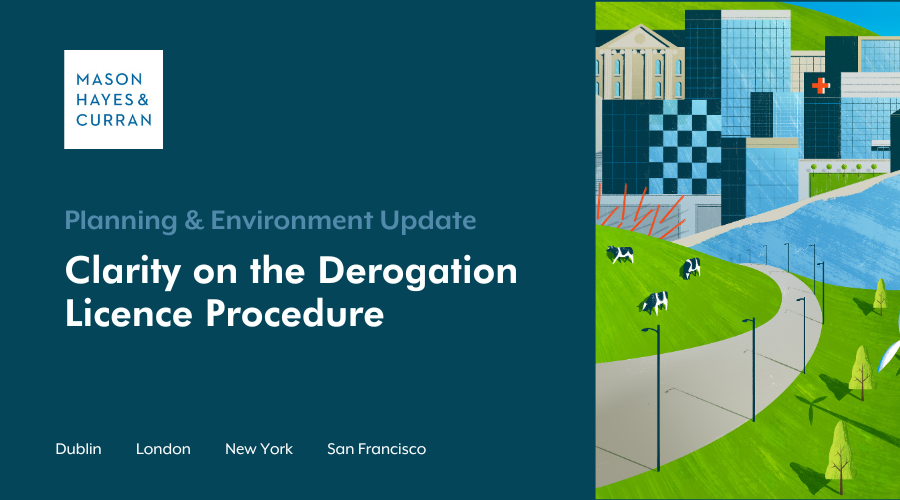
Judicial review proceedings were brought by the Hellfire Massy Residents’ Association (Residents’ Association) in the High Court relating to the proposed Dublin Mountains Visitor Centre. The Centre was proposed to be built in the vicinity of the Hellfire Club at Montpelier Hill and planning permission was granted in June 2020.
The Residents’ Association sought a declaration that Regulations 51 and 54 of the European Communities (Birds and Natural Habitats) Regulations 2011 (2011 Regulations) were incompatible with EU law relating to the derogation licence process. The 2011 Regulations transpose elements of the Habitats Directive. Derogation licences are licences to disturb or interfere with a protected plant or animal species.
One of the issues of contention with derogation licences is that they may be issued post development consent. This is due to the fact that in some instances a developer may not be in a position to ascertain whether a development would fall within the strict protection rules under the 2011 Regulations until after the grant of planning permission. It was also argued that derogation licences do not provide for public consultation which, it was alleged, is incompatible with the Aarhus Convention and EU law.
This resulted in four questions being referred to the Court of Justice of the European Union (CJEU) for determination by Mr. Justice Humphreys in his judgment delivered on 2 July 2021:
- Whether the general principles of supremacy of EU law have the effect that a rule of domestic procedure should be read in conjunction with the Aarhus Convention as an integral part of the EU legal order
- Whether domestic procedural rules against “hypothetical” challenges are valid in the context of challenges based on EU law where there is a reasonable possibility of future damage
- Whether the derogation licence system provided for in domestic law should be integrated within the planning process and whether a derogation licence should be applied for following the grant of development consent, and
- Whether public participation should be provided for in the derogation licence process
See our previous article which provides a case summary..
Consideration by the CJEU
The CJEU delivered its judgment on 6 July 2023.
Regarding the third and fourth question, the CJEU held that the 2011 Regulations were compatible with EU law as they reproduce, word for word, the main content of Articles 12 and 16 of the Habitats Directive. The Court also stated that the derogation procedure is not required to be integrated into the procedures for granting development consent.
The CJEU also agreed with the judgment of Mr Justice Humphreys that at the time of granting the planning permission the need to obtain a derogation licence had not been identified. Consequently, it did not need to be ascertained whether members of the public concerned derive a right to participate in the administrative procedure, relating to such a derogation, from the provisions of the Aarhus Convention.
On the first and second question, the CJEU found that it is not necessary to answer these questions as it was apparent that these questions gave rise to the third and fourth question.
The CJEU concluded:
“Articles 12 and 16 of Council Directive 92/43/EEC of 21 May 1992 on the conservation of natural habitats and of wild fauna and flora must be interpreted as meaning that a piece of national legislation intended to transpose those provisions into national law cannot be regarded as contrary to that directive on the ground that that piece of national legislation does not provide for (i) a development consent procedure which involves a decision by a competent authority determining whether it is necessary to apply for a derogation under Article 16 of the abovementioned directive because of matters identified following the grant of development consent to a project and/or whether surveys are required to that end or (ii) public participation in that derogation procedure.”
Conclusion
In a welcome clarification for developers, the lawfulness of the current derogation licencing procedure has been upheld and derogation licences can continue to be granted post consent provided certain conditions are met.
The full judgment of the CJEU is available here.
For more information, please contact a member of our Planning & Environment team.
The content of this article is provided for information purposes only and does not constitute legal or other advice.
People Also Ask
What is a derogation licence? It’s a licence to disturb or interfere with protected plant and animal species |



